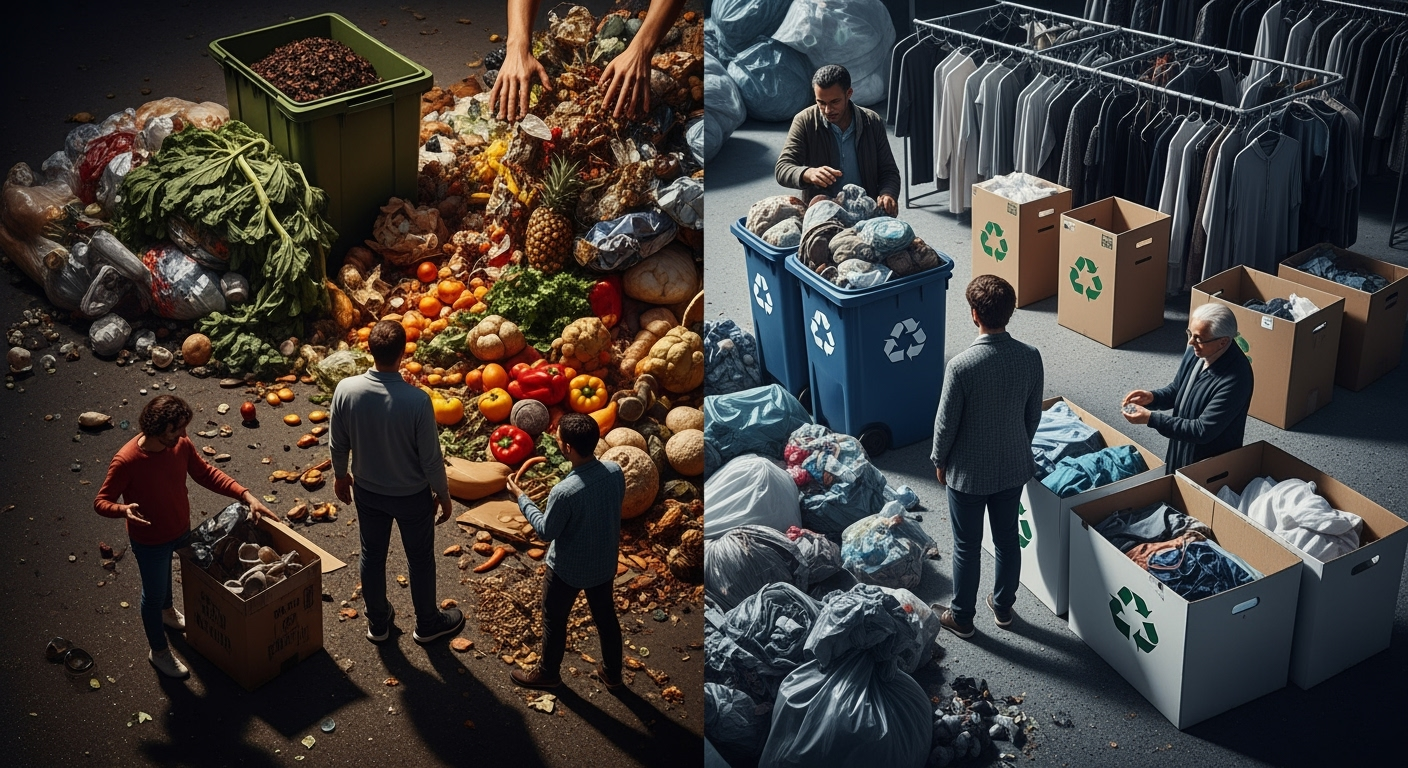Related Articles

The Unseen Costs: Dissecting the Dark Side of Viral Food Trends

Solar's Bold Horizon: Powering Earth and Beyond in a New Energy Era





Brussels, Belgium – In a pivotal move towards a more sustainable future, the European Union has enacted a comprehensive legislative package designed to drastically reduce food and fast fashion waste across its member states. The new directives introduce binding reduction targets for food waste and establish robust Extended Producer Responsibility (EPR) schemes for textiles, signaling a significant shift away from the linear "take, make, dispose" economic model. This ambitious legislative overhaul, a cornerstone of the European Green Deal and the Circular Economy Action Plan, aims to alleviate environmental burdens, conserve resources, and foster a more circular economy by 2030.
The European Union grapples with immense quantities of waste each year, posing significant environmental and economic challenges. Annually, approximately 60 million tons of food, equating to 130 kilograms per person, are discarded across the bloc. This staggering volume results in an estimated economic loss of €132 billion. Beyond the financial cost, food waste contributes approximately 16% of the total greenhouse gas emissions from the EU food system, and exacerbates the demand for scarce natural resources such such as land, water, and fertilizers. Simultaneously, around 40 million people in the EU struggle to afford a quality meal every second day, underscoring the stark societal implications of food waste.
The textile sector presents a similar, equally pressing concern. European citizens generate an estimated 12.6 million tons of textile waste annually, with each individual contributing roughly 15 kilograms of discarded clothing. The global recycling rate for textiles remains alarmingly low, with less than one percent of all textiles being repurposed into new products. The production cycle itself is resource-intensive; manufacturing a single cotton T-shirt, for instance, requires an estimated 2,700 liters of fresh water, equivalent to an average person's drinking needs for two and a half years. The fast fashion industry, characterized by rapid production cycles, low prices, and encouragement of overconsumption, has significantly fueled this waste crisis, leading to considerable environmental degradation and reliance on fossil fuels for synthetic fibers.
The new legislation, specifically the revised Directive (EU) 2008/98/EC on waste, received final approval from the European Parliament on September 9, 2025, and was published in the Official Journal of the EU on September 26, coming into force on October 16, 2025. This directive is an integral part of the broader European Green Deal and the Circular Economy Action Plan, which collectively outline a roadmap for making the EU economy fit for a greener future.
For food waste, the directive introduces legally binding reduction targets that member states must achieve by the end of 2030, using the average annual levels between 2021 and 2023 as a baseline. These targets mandate a 10% reduction in food waste generated during processing and manufacturing. Additionally, a more ambitious 30% reduction per capita is required across retail, restaurants, food services, and households. While these targets represent a significant step, some environmental advocacy groups have expressed disappointment, noting that they fall short of the United Nations Sustainable Development Goal 12.3, which calls for a 50% reduction in per capita global food waste by 2030.
Regarding textiles, the EU's approach is guided by the "EU Strategy for Sustainable and Circular Textiles," adopted in March 2022. This strategy envisions a future where all textile products placed on the EU market by 2030 are durable, repairable, recyclable, predominantly made from recycled fibers, and free of hazardous substances. The overarching principle is to make "fast fashion out of fashion," promoting quality over quantity and encouraging a transition to more sustainable, circular business models within the sector.
The EU's strategy for food waste reduction combines mandatory targets with a suite of practical measures designed to be implemented at national levels. Member states are encouraged to adopt innovative approaches to prevention, including promoting the consumption of "ugly" fruit and vegetables that are perfectly edible but often discarded due to cosmetic imperfections.
A key element of the new policy is the emphasis on redistribution. Companies producing or selling food are now expected to make unsold, yet safe-to-consume, products available for donation to food banks and other redistribution organizations. To further minimize waste, the directive also advocates for clearer and more consistent expiration dates on products and explores the use of active packaging technologies to extend shelf life. While binding targets are set, individual countries retain the flexibility to choose the most effective means to achieve these goals, tailoring solutions to their specific contexts. The European Commission will conduct a formal review by the end of 2027 to assess progress and consider potentially tightening the reduction targets for 2035.
The battle against fast fashion waste is being waged on multiple fronts, primarily through the introduction of mandatory and harmonized Extended Producer Responsibility (EPR) schemes for textiles across all EU member states. These schemes will hold producers—including domestic brands, online marketplaces, and non-EU based e-commerce sellers—financially accountable for the entire lifecycle of their products. This means they will be responsible for covering the costs associated with the collection, sorting, and recycling of clothing, footwear, accessories, hats, blankets, curtains, and linens that they place on the market. EPR schemes are mandated to be operational by April 17, 2028, with micro-enterprises granted an additional year until April 17, 2029, to comply.
A significant feature of the EPR framework is "eco-modulation," which allows for financial contributions to be adjusted based on the environmental performance of textile products. This mechanism aims to penalize short-lived, cheaply made items that are difficult to recycle, thereby incentivizing the production of more durable, repairable, and recyclable goods.
Complementing EPR, the EU is implementing stringent eco-design requirements for textiles, focusing on features that enhance durability, reparability, and recyclability, as well as mandating minimum recycled content. A Digital Product Passport will also be introduced, providing consumers and stakeholders with comprehensive, transparent information about a product's circularity, environmental impact, durability, and reparability. Furthermore, the directive seeks to curb overproduction and overconsumption by discouraging the destruction of unsold or returned textiles. From 2026, large companies will face a ban on destroying unsold clothes, shoes, and accessories. The legislation also addresses greenwashing practices and aims to tackle the unintentional release of microplastics from synthetic textiles. To prevent externalizing its waste problem, the EU has introduced measures to restrict the export of textile waste, promoting recycling and reuse within the bloc.
The EU's concerted effort to slash food and fast fashion waste marks a transformative period for its economy and environmental policy. By targeting these two highly resource-intensive sectors, the Union aims to significantly reduce its ecological footprint and foster a robust circular economy. This legislative package underscores a commitment to the European Green Deal's overarching goal of achieving climate neutrality by 2050 and doubling the circularity rate to 24% by 2030.
The success of these initiatives will rely on the collaborative efforts of member states, industry players, and consumers. While the transition may present challenges, particularly for businesses needing to adapt their models and supply chains, the long-term benefits are projected to be substantial—leading to a more resilient economy, reduced environmental impact, and a higher quality of life for European citizens. The new directives signal an unambiguous message that waste generation, particularly from everyday consumption, is no longer an acceptable norm, paving the way for a more sustainable and responsible future.